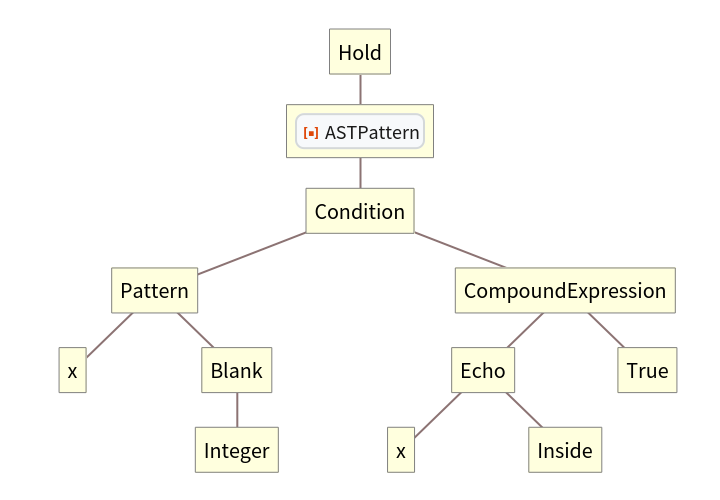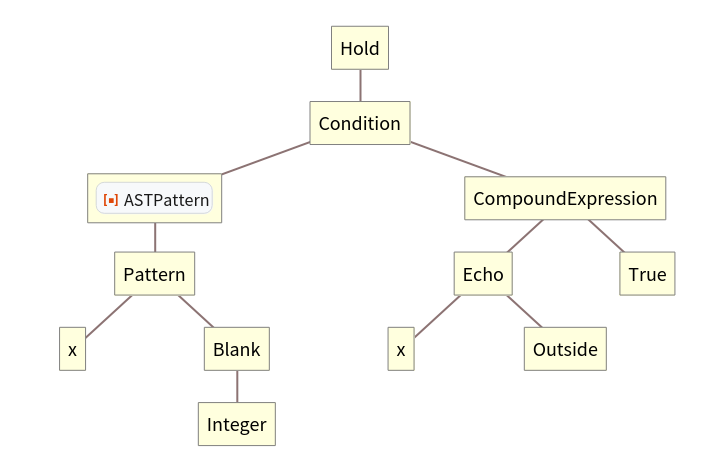Scope (3)
Use the second argument of ASTPattern to match node metadata:
Match only nodes that start on a particular line:
Bind parts of metadata in pattern names:
Applications (2)
Parse a Wolfram Language file to get an abstract syntax tree:
Extract all nodes from the AST that correspond to a pattern:
Convert to expressions:
Extract source positions:
Extract the corresponding parts of the file as strings:
Create a CodeCases function:
Compare to string matching:
This incorrectly matched part of the usage message as code:
When matching against the AST, there's no need to account for different types of input syntax:
Properties and Relations (4)
The single-argument form of ASTPattern is effectively invisible to an outer ASTPattern:
The two-argument form inserts the corresponding metadata patterns:
Get an AST node corresponding to a simple expression:
For simple patterns, the performance of matching an ASTPattern is comparable to normal pattern matching:
Matching patterns that require evaluation typically incur significant cost as an ASTPattern:
Compare to normal pattern matching:
Some pattern tests allow for optimized patterns:
This will only work for certain pattern tests that appear literally:
Pattern bindings that stay within ASTPattern correspond to expressions:
Once a value passes outside of ASTPattern, the binding corresponds to the AST node:
Note that all instances of the pattern symbol appear below ASTPattern in this case:
In this case, there is an x that's "lifted" out of the ASTPattern, which is why it appears as an AST node:
Possible Issues (4)
ASTPattern cannot generalize to all possible WL patterns:
In this case, the pattern binding prevents matching, since the metadata will always be different between nodes:
Without any repeated binding this pattern will match:
Not all raw patterns are supported by ASTPattern:
Unsupported patterns are represented verbatim:
ASTPattern ignores the Unevaluated wrapper:
Use HoldPattern instead:
ASTPattern must evaluate in order to create the desired pattern, so it should not be wrapped in HoldPattern:
Use HoldPattern within ASTPattern instead:



![Cases[CodeParser`CodeParse["f[x_]:=x+y;\ny=1;"], ResourceFunction["ASTPattern"][_, KeyValuePattern["Definitions" -> defs_]] :> defs, Infinity]](https://www.wolframcloud.com/obj/resourcesystem/images/930/93044c24-6917-43b0-a0a4-242ef86d6b1a/3dcc194cc9f0c310.png)
![Cases[CodeParser`CodeParse["1+1\n2+2\n3+3"], ResourceFunction["ASTPattern"][_, KeyValuePattern[CodeParser`Source -> {{2, _}, _}]], Infinity]](https://www.wolframcloud.com/obj/resourcesystem/images/930/93044c24-6917-43b0-a0a4-242ef86d6b1a/4a3e236ba33cc7cc.png)





![pos = Cases[ast, ResourceFunction["ASTPattern"][Collatz[_], KeyValuePattern[CodeParser`Source -> src_]] :> src, Infinity]](https://www.wolframcloud.com/obj/resourcesystem/images/930/93044c24-6917-43b0-a0a4-242ef86d6b1a/72d4313852213151.png)
![CodeCases[file_File, patt_] := CodeCases[ReadString[file], patt];
CodeCases[string_String, patt_] := StringTake[string, Cases[CodeParser`CodeParse[string, "SourceConvention" -> "SourceCharacterIndex"], ResourceFunction["ASTPattern"][patt, KeyValuePattern[CodeParser`Source -> src_]] :> src, Infinity]];](https://www.wolframcloud.com/obj/resourcesystem/images/930/93044c24-6917-43b0-a0a4-242ef86d6b1a/596766c87b436212.png)





![ast = CodeParser`CodeParse["1+2"];
Cases[ast, ResourceFunction["ASTPattern"][
x_Integer /; (Echo[x, "Inside"]; True)], Infinity]](https://www.wolframcloud.com/obj/resourcesystem/images/930/93044c24-6917-43b0-a0a4-242ef86d6b1a/1532356e2282c954.png)




